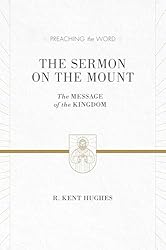EP 138: Judge Not, That You Not Be Judged (Matthew 7:1-6 – Sermon on the Mount Series)
Inside: When we see ourselves and our sin rightly, when we are broken by our sin and in a place of humility, we will be in a place to remove the speck from our brother’s eye.

How do we judge correctly? What does it mean when Jesus tells us not to judge, and why shouldn’t we wrongly judge others? There is much covered in our text today in Matthew 7:1-6 to walk through together.
Matthew 7:1-6:
7 “Judge not, that you be not judged. 2 For with the judgment you pronounce you will be judged, and with the measure you use it will be measured to you. 3 Why do you see the speck that is in your brother’s eye, but do not notice the log that is in your own eye? 4 Or how can you say to your brother, ‘Let me take the speck out of your eye,’ when there is the log in your own eye? 5 You hypocrite, first take the log out of your own eye, and then you will see clearly to take the speck out of your brother’s eye.
6 “Do not give dogs what is holy, and do not throw your pearls before pigs, lest they trample them underfoot and turn to attack you.
Being a Christian for any amount of time, we know how often we hear this verse being misinterpreted. Many read this passage and say we should never judge anyone or ever exercise critical judgment.
We know if we just read the rest of Matthew 7:1-6 alone that it’s clear we need discernment and sound judgment to determine who are the “dogs” and the “pigs” mentioned in this passage. Even further down in Matthew 7, we need to know the false prophets (Matthew 7:15-20).
We want to avoid falling into the camp of never rightly judging or exercising proper discernment. We are called to exercise proper critical judgment, and it’s been said that a discerning spirit is constructive, and a hypercritical spirit is destructive. So we need to be on the constructive side.
As we look to Jesus and see Him as our example, we want to address our sins and deal with them. Seeing Jesus as our perfect example also makes us want to be merciful with others as we’ve been shown mercy.
As we work through this text today, my hope is we will first be mindful to remove the log from our own eye before removing the speck from our neighbor’s. It is too easy to be much more tolerant of our own sin than we are to the sin of others.
R. Kent Hughes:
“We find it so easy to turn a microscope on another person’s sin while we look at ours through the wrong end of a telescope.”
When we see ourselves and our sin rightly, when we are broken by our sin and in a place of humility, we will be in a place to remove the speck from our brother’s eye.
Listen in to EP 138: Judge Not, That You Not Be Judged:
Recommended Resources:

Studies in the Sermon on the Mount by D. Martyn Lloyd Jones

The Sermon on the Mount: The Message of the Kingdom by R. Kent Hughes
Show Notes:
The ideal Christian, and especially the ideal clergyman, is an undiscerning, flabby, indulgent, all-accepting jellyfish who lives out the misinterpretation of “judge not.”
~ R. Kent Hughes, The Sermon on the Mount: The Message of the Kingdom
This is the Bible verse that seems to be most popular in our present day. But most of the people who quote this verse don’t understand what Jesus said. They seem to think Jesus commanded a universal acceptance of any lifestyle or teaching. If we see what Jesus said in Matthew 7:15-16, He commands us to know people by the fruit of their life, and some sort of assessment is necessary for that.. The Christian is called to unconditionally love. But the Christian is not called to unconditional approval. We really can love people who do things that should not be approved of. Instead, Jesus is speaking against being judgmental, that is, judging motives and the inner man, which only God can know. We can judge the fruit of a man, but we can rarely judge their motives with accuracy.
Jesus does not prohibit judgment of others. He only requires that our judgment be completely fair, and that we only judge others by a standard we would also like to be judged by. Most of our judgment in regard to others is wrong, not because we judge according to a standard, but because we are hypocritical in the application of that standard – we ignore the standard in our own life.
We judge others by one standard, and ourselves by another standard – being far more generous to ourselves than others. With the measure you use, it will be measured back to you:
According to the teaching of some rabbis in Jesus’ time, God had two measures that He used to judge people. One was a measure of justice and the other was a measure of mercy. Which measure do you want God to use with you? Then you should use that same measure with others. (Mt 7:2).
~ David Guzik
There are two eternal judgments. One is the separation of believers and nonbelievers, “the sheep from the goats” (Matthew 25:31-46). True believers, of course, are the sheep who will go to be with God and who will appear before the Judgment Seat of Christ to receive their proper rewards. There God will judge us as we have judged others. Judgmental believers will still go to be with God forever, but they will have very little reward, for their hypercritical spirit will have vitiated (VI-SHE-ATE or destroyed) much of the good they had done. Very few of us dare to pray, “God, judge me as I judge my fellow men and women.” Our Lord means to put a holy fear in us so we will put away our critical hearts! God is going to judge us as we judge others. The tone of our life is going to become the tone of our judgment.”
~ R. Kent Hughes, The Sermon on the Mount: The Message of the Kingdom
The fact of the matter is that we are not really concerned about helping this other person; we are interested only in condemning him. We pretend to have this great interest; we pretend that we are very distressed at finding this blemish. But in reality, as our Lord has already shown us (and this is the horrible part), we are really glad to discover it. It is hypocrisy.
Our Lord says, if you really want to help other people, if you are genuine and true in this matter, there are certain things you have to do yourself. First—and we must notice this—first cast the beam out of thine own eye, and then thou shalt see clearly to cast out the mote out of thy brother’s eye.
~ D. Martyn Lloyd Jones, Studies in the Sermon on the Mount
“We saw at the beginning of these studies that is was for the poor in spirit (not the proud), those who mourn for their sin (not the carefree), the ones whom God has made meek (not the boastful) to whom these teachings are given. You must have the Spirit of Christ within before you can take up his ethics.”
~ James Montgomery Boice, The Sermon on the Mount: Matthew 5-7
It is often impossible to talk to some people about Jesus Christ. Their insensitiveness, their moral blindness, their intellectual pride, and cynical mockery, the tarnishing film, may make the impervious to words about Christ. But it is always possible to show men Christ and the weakness of the Church lies not in lack of Christian arguments, but in lack of Christian lives.”
We need discernment with how to handle the Word of God and be mindful of the different people and their spiritual condition we are dealing with. We want the gospel to offend – we don’t want to be offensive in our mannerisms or interaction with them or the way we speak to them.
As believers, we have been given true riches and they are found in God’s Word – they are our treasure.
~ William Barclay
Scripture References:
- Matthew 7:1-6
- Matthew 7:15-20
- Romans 14
- Matthew 7:15-16
- Matthew 25:31-46
- 1 Corinthians 13
- Acts 18:6
- Psalm 119:105
- Psalm 119:50
- Psalm 119:54
- Psalm 119:11
- 1 Corinthians 13:4-7
Recommended Resources:
- Studies in the Sermon on the Mount by Martyn Lloyd Jones
- Sermon on the Mount The: Matthew 5-7 Expositional Commentary by James Montgomery Boice
- Matthew 1-7 MacArthur New Testament Commentary by John MacArthur
- Expository Thoughts on the Gospel of Matthew by J.C. Ryle
- The Sermon on the Mount: The Message of the Kingdom (ESV Edition) by R. Kent Hughes
- Sermon on the Mount by Sinclair Ferguson
- The Beatitudes: An Exposition of Matthew 5:1-12 by Thomas Watson
- The Message of the Sermon on the Mount by John Stott
- Sermon on the Mount Teaching Series by Sinclair Ferguson at Ligonier Connect
- Logos Bible Software
- Bible Memory App
- Study Guide for Sermon on the Mount

Mugs
Ceramic mugs

